
Milk is a nutrient-rich liquid food produced by the mammary glands of mammals. It is the primary source of nutrition for young mammals, including breastfed human infants before they are able to digest solid food. Early-lactation milk is called colostrum, which contains antibodies that strengthen the immune system and thus reduces the risk of many diseases. It holds many other nutrients, including protein and lactose. Interspecies consumption of milk is not uncommon, particularly among humans, many of whom consume the milk of other mammals.
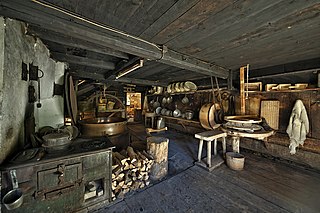
A dairy is a business enterprise established for the harvesting or processing of animal milk – mostly from cows or buffaloes, but also from goats, sheep, horses, or camels – for human consumption. A dairy is typically located on a dedicated dairy farm or in a section of a multi-purpose farm that is concerned with the harvesting of milk.

A farmers' market is a physical retail marketplace intended to sell foods directly by farmers to consumers. Farmers' markets may be indoors or outdoors and typically consist of booths, tables or stands where farmers sell their produce, live animals and plants, and sometimes prepared foods and beverages. Farmers' markets exist in many countries worldwide and reflect the local culture and economy. The size of the market may be just a few stalls or it may be as large as several city blocks. Due to their nature, they tend to be less rigidly regulated than retail produce shops.

Organic certification is a certification process for producers of organic food and other organic agricultural products. In general, any business directly involved in food production can be certified, including seed suppliers, farmers, food processors, retailers and restaurants. A lesser known counterpart is certification for organic textiles that includes certification of textile products made from organically grown fibres.

Bovine somatotropin or bovine somatotrophin, or bovine growth hormone (BGH), is a peptide hormone produced by cows' pituitary glands.
Land O'Lakes, Inc. is an American member-owned agricultural cooperative based in the Minneapolis-St. Paul suburb of Arden Hills, Minnesota, United States, focusing on the dairy industry. The cooperative has 1,959 direct producer-members, 751 member-cooperatives, and about 10,000 employees who process and distribute products for about 300,000 agricultural producers, handling 12 billion pounds of milk annually. It is ranked third on the National Cooperative Bank Co-op 100 list of mutuals and cooperatives. The co-op is one of the largest producers of butter and cheese in the United States through its dairy foods business; serves producers, animal owners and their families through more than 4,700 local cooperatives, independent dealers and other large retailers through its Purina Animal Nutrition business; and delivers seed, crop protection products, agricultural services and agronomic insights to 1,300 locally owned and operated cooperative and independent agricultural retailers and their grower customers through its WinField United business.

Raw milk or unpasteurized milk is milk that has not been pasteurized, a process of heating liquid foods to kill pathogens for safe consumption and extending the shelf life. Proponents of raw milk have stated that there are benefits to its consumption, including better flavor, better nutrition, and the building of a healthy immune system. However, the medical community has warned of the dangers, which include a risk of infection, and has not found any clear benefit.
A marketing board is an organization created by many producers to try to market their product and increase consumption and thus prices. It can also be defined as an organization set up by a government to regulate the buying and selling of a certain commodity within a specified area. They most commonly exist to help sell farm products such as milk, eggs, beef or tripe and are funded by the farmers or processors of those crops or products. Marketing boards often also receive funding from governments as an agricultural subsidy. The leadership and strategies of the marketing boards are set through votes by the farmers who are members of the board.
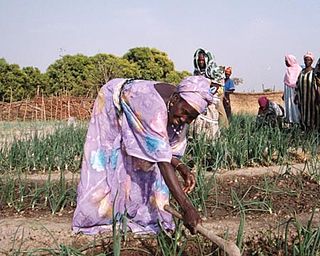
An agricultural cooperative, also known as a farmers' co-op, is a cooperative where farmers pool their resources in certain areas of activity. A broad typology of agricultural cooperatives distinguishes between 'agricultural service cooperatives', which provide various services to their individually farming members, and 'agricultural production cooperatives', where production resources are pooled and members farm jointly. Examples of agricultural production cooperatives include collective farms in former socialist countries, the kibbutzim in Israel, collectively governed community shared agriculture, Longo Mai co-operatives and Nicaraguan production co-operatives.

Dairy Farmers of America Inc. (DFA) is a national milk marketing cooperative in the United States. It is owned by and serves more than 13,000 dairy farmer-members representing more than 7,500 dairy farms in 47 states. DFA markets members' raw milk and sells milk and derivative products to wholesale buyers both domestically and abroad. Net sales in 2016 were $13.5 billion, representing about 22 percent of raw milk production in the United States.
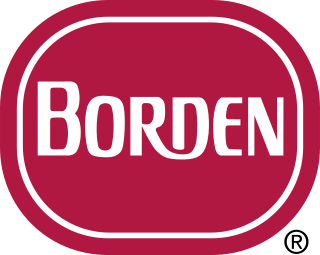
Borden, Inc., was an American producer of food and beverage products, consumer products, and industrial products. At one time, the company was the largest U.S. producer of dairy and pasta products. Its food division, Borden Foods, was based in Columbus, Ohio, and focused primarily on pasta and pasta sauces, bakery products, snacks, processed cheese, jams and jellies, and ice cream. It was best known for its Borden Ice Cream, Meadow Gold milk, Creamette pasta, and Borden Condensed Milk brands. Its consumer products and industrial segment marketed wallpaper, adhesives, plastics and resins. By 1993, sales of food products accounted for 67 percent of its revenues. It was also known for its Elmer's Glue and Krazy Glue.
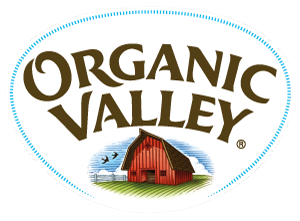
Organic Valley (OV) is an organic food brand and independent cooperative of organic farmers based in La Farge, Wisconsin, United States. Founded in 1988, Organic Valley is the nation’s largest farmer-owned organic cooperative and one of the world's largest organic consumer brands.
The Farmer-to-Farmer (F2F) Program is funded by the US Agency for International Development through the US Farm Bill to assist developing countries, middle-income countries, and emerging markets around the world to increase farm production and incomes. It promotes sustainable economic growth, food security and agricultural development worldwide. Volunteer technical assistance from US farmers, agribusinesses, cooperatives, and universities helps developing countries improve productivity, access new markets, build local capacity, combat climate change and conserve environmental and natural resources. Farmer-to-Farmer also aims to increase the American public's understanding of international development issues and programs and international understanding of the U.S. and U.S. development programs.

National Dairy Producers Union (SOYUZMOLOKO) – is a nonprofit organization based in Moscow, Russia. SOYUZMOLOKO unites milk producers and dairy processors as well as numerous service companies to represent their interests thus providing the dairy industry in Russia with economically favorable conditions.
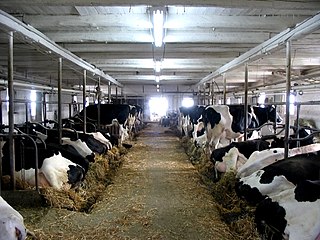
Dairy farming is one of the largest agricultural sectors in Canada. Dairy has a significant presence in all of the provinces and is one of the top two agricultural commodities in seven out of ten provinces.
Dairy Farmers of Ontario (DFO), is the marketing organization and regulatory body representing over 4,000 dairy farmers in Ontario, Canada. DFO was formerly known as the Ontario Milk Marketing Board (OMMB), which was established as result of the 1965 Ontario Milk Act. On August 1, 1995 the Ontario Milk Marketing Board and the Ontario Cream Producers' Marketing Board merged to form Dairy Farmers of Ontario.

Supply management (SM) is a national agricultural policy framework used in Canada that controls the supply of dairy, poultry and eggs through production and import controls and pricing mechanisms. The supply management system was authorized by the 1972 Farm Products Agencies Act, which established the two national agencies that oversee the system. The Agriculture and Agri-Food Canada federal department is responsible for both the Canadian Dairy Commission and its analogue for eggs, chicken and turkey products, the Farm Products Council of Canada. Five national supply management organizations, the SM-5 Organizations — Egg Farmers of Canada (EFC), Turkey Farmers of Canada (TFC), Chicken Farmers of Canada (CFC), the Canadian Hatching Egg Producers (CHEP) and the Ottawa-based Canadian Dairy Commission (CDC), a Crown corporation — in collaboration with provincial and national governing agencies, organizations and committees, administer the supply management system.
The Ohio Department of Agriculture (ODA) is the administrative department of the Ohio state government responsible for ensuring the safety of the food supply, to maintain the health of animals and plant life, to create economic opportunities for farmers, food processors and agribusinesses, and to inspect amusement park rides in the state of Ohio.
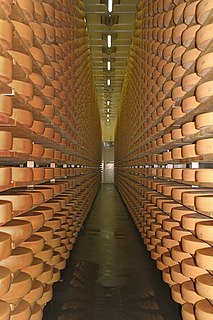
The KäseStrasse Bregenzerwald is a non-profit organization and route which links cheese-producing businesses of the Bregenz Forest in Vorarlberg (Austria). The organization is a group of Bregenzerwald farmers, craftsmen and tradesmen. All members and partners of the KäseStrasse contribute to preserving Bregenzerwald's agriculture, the Alpine transhumance and its domestic products.













